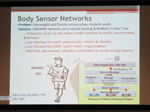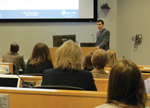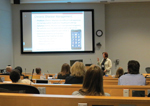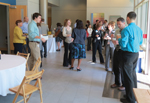|
Showing slide
after slide of the innovative ways
researchers are using mobile
health technology, a National
Institutes of Health administrator
encouraged attendees of a
scientific retreat to extend the
reach of this tool in reshaping
health care.
 Researchers are
working with body sensor
networks to combat obesity
issues in urban youth. Researchers are
working with body sensor
networks to combat obesity
issues in urban youth.
Wendy Nilsen,
Ph.D., was the keynote speaker at
the Mobile Health Technology
retreat April 26 that was
sponsored by the South Carolina
and Translational Institute.
Researchers from MUSC, Clemson
University and the University of
South Carolina presented
highlights of their research
during the event that was attended
by more than 80 participants.
MUSC President
Ray Greenberg, M.D., Ph.D.,
welcomed attendees. He said the
retreat offered a great
opportunity for partnerships to be
forged and fits into MUSC's
strategic plan of fostering
innovation and technology.
Attending the conference were
professionals representing a wide
range of specialties, including
clinicians, engineers, software
planners and entrepreneurs.
 Dr. John
McGillicuddy in MUSC's
Department of Surgery gives an
overview of how mobile
technology is being studied as a
way to help kidney transplant
patients adhere to their
medications. Dr. John
McGillicuddy in MUSC's
Department of Surgery gives an
overview of how mobile
technology is being studied as a
way to help kidney transplant
patients adhere to their
medications.
Nilsen, chair
of NIH's Mobile Health Training
Institute and Health Scientist
Administrator in the Office of
Behavioral and Social Sciences
Research, said the portability of
the technology and ability to
deliver personalized medicine
makes it an exciting area to
explore that goes far beyond
telemedicine. The technology
offers ways to give realtime
feedback to patients to empower
them to manage their own health.
Wendy
Nilsen of the NIH explores the
exciting future of mobile health
technology at a retreat held in
MUSC's Bioegineering Building.
She highlighted
research that ranges from wearable
chemical sensor systems to body
sensor networks. There are more
than 20,000 apps on health and
fitness, but few have empirical
evidence showing of how well they
work. She encouraged the
participants to form
interdisciplinary collaborations
and use her office as a resource
for future research and grants.
"It's your good
ideas that we're looking for."
Her
suggestions:
- Join
the listserv
mHealth-Training@list.nih.gov
- Check
out the mHealth Training
Institutes that offer five-day
trainings to help
professionals develop the
skills to improve the design
and research of mobile
technology.
- Contact
her if researchers are looking
for more information on
funding or ways to collaborate
with colleagues at
nilsenwj@ad.nih.gov or
301-496-0979.
Breaks
and breakout sessions at the
retreat offer opportunities for
attendees to network.
For more
information on SCTR, visit http://sctr.musc.edu
or call 792-8300.
|



 Researchers are
working with body sensor
networks to combat obesity
issues in urban youth.
Researchers are
working with body sensor
networks to combat obesity
issues in urban youth. Dr. John
McGillicuddy in MUSC's
Department of Surgery gives an
overview of how mobile
technology is being studied as a
way to help kidney transplant
patients adhere to their
medications.
Dr. John
McGillicuddy in MUSC's
Department of Surgery gives an
overview of how mobile
technology is being studied as a
way to help kidney transplant
patients adhere to their
medications.
